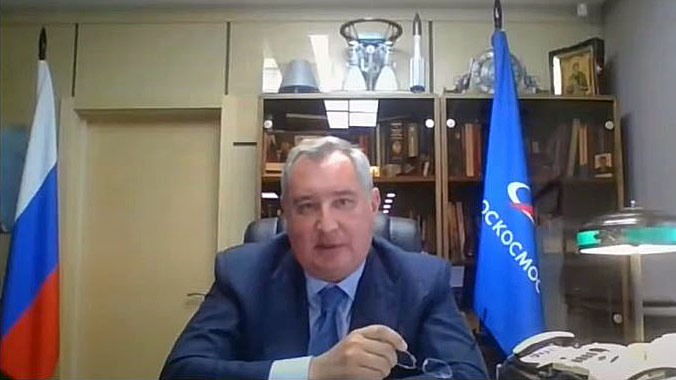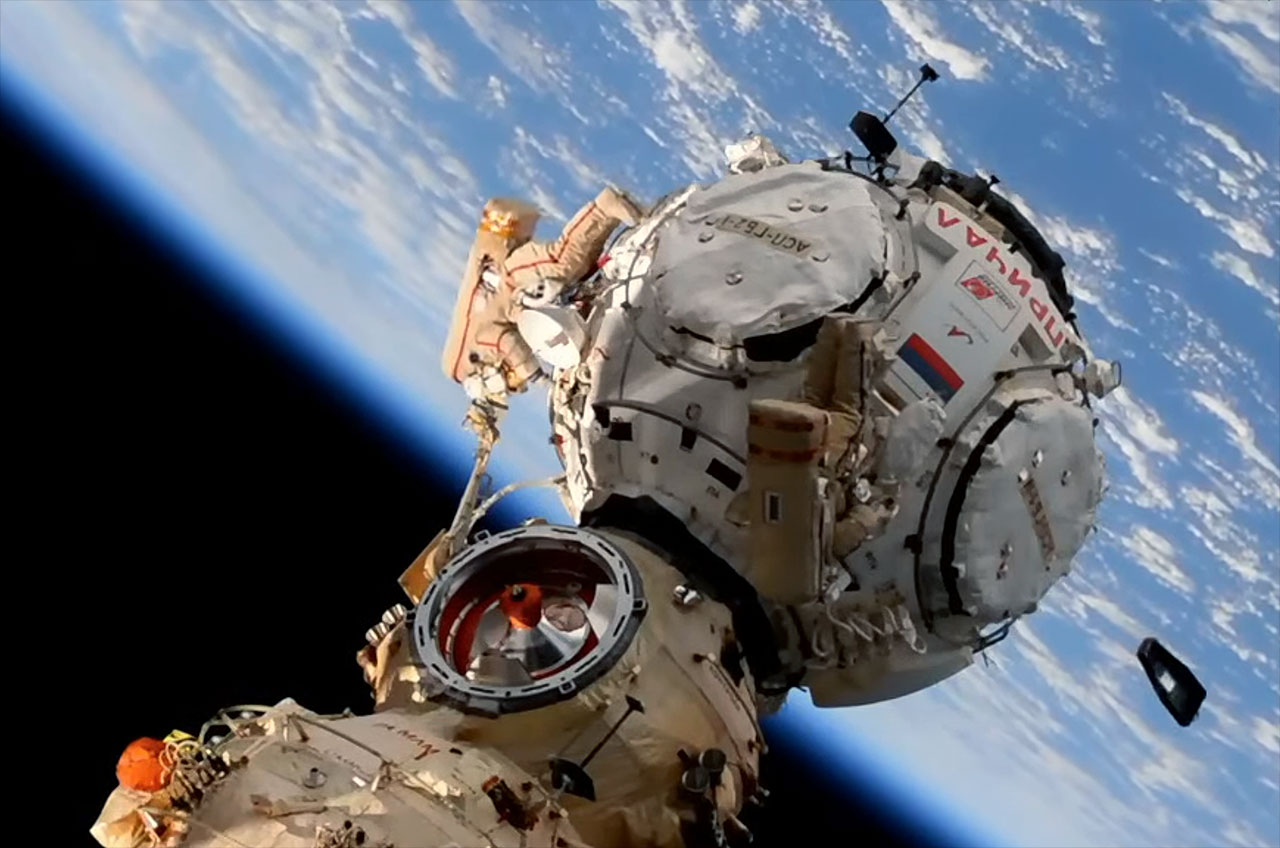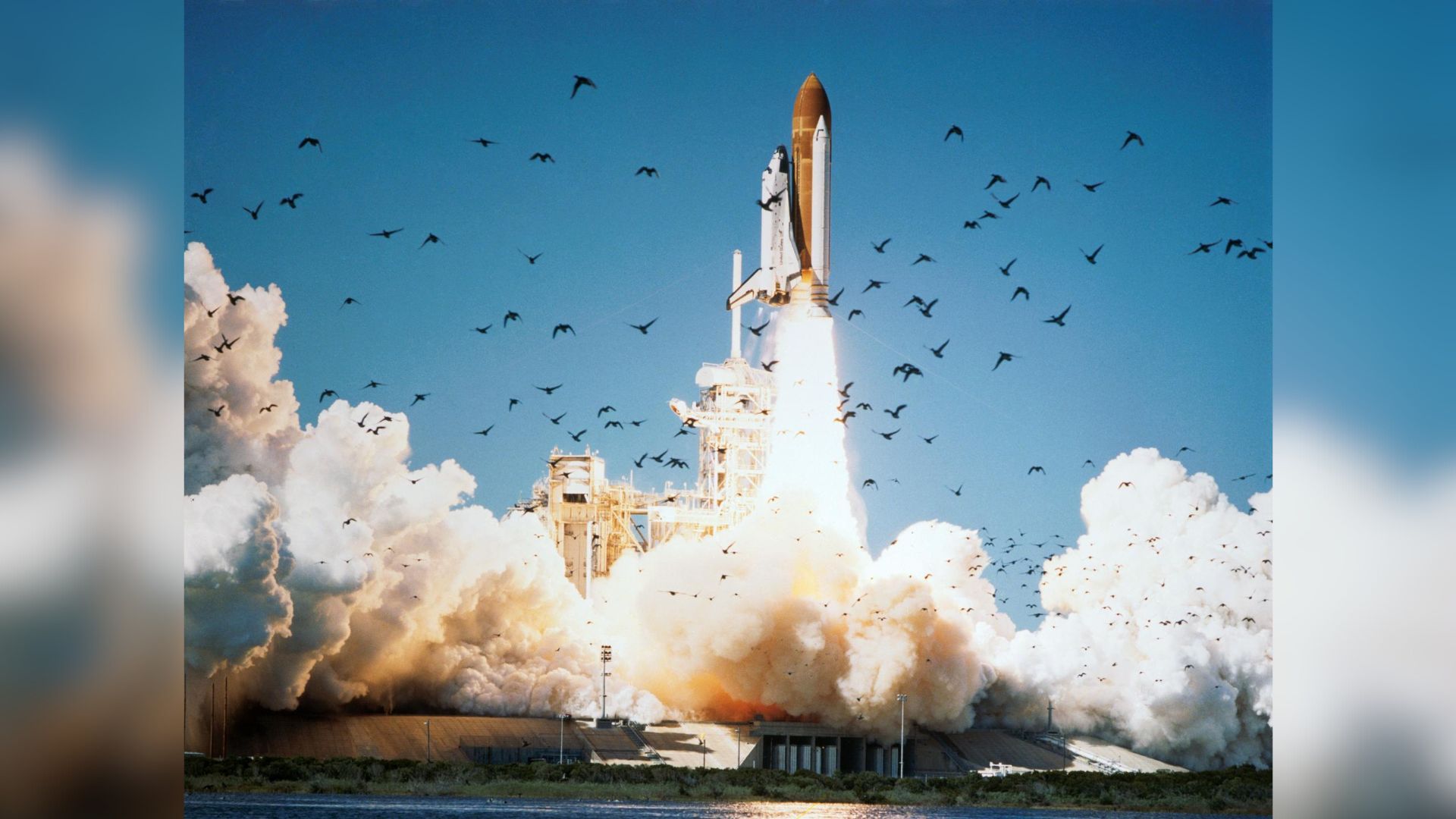Russian space program chief says US sanctions could 'destroy' International Space Station partnership
'Do you want to destroy our cooperation on the ISS?'

The head of Russia's space agency warned Thursday (Feb. 24) that new sanctions imposed on his country could have dire consequences for the International Space Station program.
"Do you want to destroy our cooperation on the ISS?" read one of the tweets from Roscosmos Director-General Dimitry Rogozin, which was translated by Rob Mitchell for Ars Technica senior space editor Eric Berger, who shared Mitchell's translation on Twitter. Russia and the United States are the major partners in the ISS program, which also includes Canada, Japan and multiple European nations.
Russia invaded Ukraine on Thursday in a series of military attacks. The action has drawn international condemnation as well as new economic sanctions, which U.S. President Joe Biden said would degrade Russia's space program. NASA, however, told Space.com later yesterday that civil cooperation between the U.S. and Russia in space will continue, particularly with regard to the ISS.
But Rogozin struck a much different tone, suggesting that the new sanctions could potentially result in the ISS crashing to Earth in an uncontrolled fashion. (The Russian segment of the ISS is responsible for guidance, navigation and control for the entire complex, according to the European Space Agency. And Russian Progress cargo craft provide periodic orbit-raising boosts for the ISS, to ensure that it doesn't sink too low into Earth's atmosphere.)
Related: What does the Ukraine invasion mean for US-Russian partnership in space?
Rogozin's tweets accused the United States of already "limiting exchanges" between Russian cosmonauts and their international counterparts, and said that further activity could irrevocably break the ISS agreement.
Pointing to Russia's controlling function on the ISS, Rogozin said Biden is "out of the loop" and is unaware that it is due to the Russian systems that the space station can dodge "dangerous conjunctions with space junk."
Breaking space news, the latest updates on rocket launches, skywatching events and more!
Rogozin said the space junk comes from the United States' "talented businessmen." He didn't name names, but that's likely a reference to SpaceX founder and CEO Elon Musk, whose company is building a huge satellite-internet constellation called Starlink. (Rogozin apparently has complicated feelings about Musk; he once invited the billionaire entrepreneur for tea.)
SpaceX has already launched more than 2,000 Starlink satellites and could eventually deliver about 40,000 of the craft to orbit.
Rogozin, however, did not mention a November incident in which a Russian anti-satellite test generated a cloud of orbital debris that threatened the crew of the ISS, forcing them to shelter in place. That test drew criticism from space debris watchers about the risk posed to the station and its crew, which includes Russian cosmonauts.
Rogozin also stressed that the ISS would deorbit naturally without periodic reboosts courtesy of Progress freighters.
The space station's roughly 250-mile-high (400 kilometers) orbit causes it to collide with some particles of Earth's atmosphere, which drags the complex down slowly over time. Just days ago, however, a Cygnus spacecraft built by aerospace company Northrop Grumman arrived at the ISS with a mandate to perform the program's first operational reboost, which may eventually transfer this capability to U.S. vehicles as well.
Nonetheless, Rogozin raised the specter of the space station going down prematurely, pointing out that its orbital inclination of 51.6 degrees does not take the complex over Russia. (The country conducts its launches from the Baikonur Cosmodrome in Kazakhstan, which is under the ISS path.)
"If you block cooperation with us, who will save the ISS from an unguided deorbit to impact on the territory of the U.S. or Europe?" Rogozin wrote. "There's also the chance of impact of the 500-ton construction in India or China."

The blustery Rogozin is well known in the space community for a 2014 threat, during a different geopolitical spat also involving Ukraine, in which he suggested that American astronauts should go to space by trampoline instead of using Russia's Soyuz spacecraft. (At the time, Russia was the sole provider of crewed trips to the space station; NASA retired its space shuttle fleet in 2011, and U.S. commercial crew vehicles such as SpaceX's Dragon capsule were still in development.)
His comments Thursday were similarly colorful. For example, Rogozin suggested that the people planning sanctions may be "suffering from Alzheimer's disease," that decision-makers are unaware that Russian rockets are "the most reliable ones in this world," and that the U.S. is seeking to "block our access to radiation-hardened microelectronics designed for use in space."
It's also not the first time Rogozin has spoken about sanctions in recent years. The trampoline comment was made in response to news of new sanctions, for example. And in 2021, the U.S. had a different set of restrictions planned due to what American officials described as Russian-led cyberattacks and election interference — a claim Russia denied at the time, according to media reports. At the time, Rogozin threatened to pull Russia from the ISS by 2025 unless the sanctions were revoked.
Rogozin's latest comments came mere months after Russia integrated a major expansion to the ISS, however. The long-awaited Nauka science module launched to the ISS in July, also inducing a spacecraft emergency due to an unplanned thruster firing that the space station partners resolved rapidly. And in November, the Prichal docking module came to the ISS without incident, expanding the number of docking ports on the Russian side.
Follow Elizabeth Howell on Twitter @howellspace. Follow us on Twitter @Spacedotcom and on Facebook.

Elizabeth Howell (she/her), Ph.D., was a staff writer in the spaceflight channel between 2022 and 2024 specializing in Canadian space news. She was contributing writer for Space.com for 10 years from 2012 to 2024. Elizabeth's reporting includes multiple exclusives with the White House, leading world coverage about a lost-and-found space tomato on the International Space Station, witnessing five human spaceflight launches on two continents, flying parabolic, working inside a spacesuit, and participating in a simulated Mars mission. Her latest book, "Why Am I Taller?" (ECW Press, 2022) is co-written with astronaut Dave Williams.
